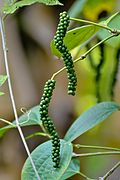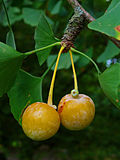Drupe
(Redirected from Drupes)
Drupe refers to a type of fruit that is characterized by having an outer fleshy part surrounding a shell (the pit or stone) of hardened endocarp with a seed inside. These fruits are part of the larger family of angiosperms, which are flowering plants. Drupes are also commonly known as stone fruits because of their hard, stony pits enclosing the seed. Examples of drupes include peaches, plums, cherries, olives, and almonds. It is important to note that in the case of almonds, the edible part is the seed, not the outer flesh.
Characteristics
Drupes typically have three distinct layers: the exocarp (outer skin), mesocarp (fleshy middle layer), and endocarp (hard, woody layer that surrounds the seed). The mesocarp is what is usually consumed, although there are exceptions, such as almonds, where the seed is the desired part. The diversity in structure among different drupes is significant, reflecting the wide range of species that produce these fruits.
Classification
In botanical terms, drupes are classified based on their development from a single ovary in a flower. They are a subset of the larger category of simple fruits, which develop from the ovary of a single flower. Drupes are further divided into categories based on the number of seeds they contain and the hardness of their endocarp.
Culinary Uses
Drupes are widely consumed around the world and are cherished for their sweet, juicy flavors and nutritional benefits. They are eaten fresh, dried, or processed into various products such as jams, juices, and oils. For example, olives are pressed to extract olive oil, which is a staple in many culinary traditions.
Agricultural Significance
The cultivation of drupe crops is economically significant in many regions. These fruits are grown in orchards and require specific climatic conditions to thrive. The production of drupes involves considerations of climate, soil type, and pest control to ensure a successful harvest.
Nutritional Value
Drupes are a good source of vitamins, minerals, and dietary fiber. They contain antioxidants and are known for their anti-inflammatory properties. Regular consumption of these fruits can contribute to a healthy diet and help in the prevention of various diseases.
Ecological Role
In nature, drupes play a crucial role in the ecosystem. They serve as a food source for a wide range of wildlife. The hardy nature of the seed allows it to survive passage through the digestive system of animals, facilitating the dispersal of seeds away from the parent plant.
Conclusion
Drupes are a diverse group of fruits that are important both ecologically and economically. They provide essential nutrients to humans and animals alike and have a significant place in various cultures around the world. Understanding the characteristics and benefits of drupes can enhance our appreciation for these remarkable fruits.
Transform your life with W8MD's budget GLP-1 injections from $125.
W8MD offers a medical weight loss program to lose weight in Philadelphia. Our physician-supervised medical weight loss provides:
- Most insurances accepted or discounted self-pay rates. We will obtain insurance prior authorizations if needed.
- Generic GLP1 weight loss injections from $125 for the starting dose.
- Also offer prescription weight loss medications including Phentermine, Qsymia, Diethylpropion, Contrave etc.
NYC weight loss doctor appointments
Start your NYC weight loss journey today at our NYC medical weight loss and Philadelphia medical weight loss clinics.
- Call 718-946-5500 to lose weight in NYC or for medical weight loss in Philadelphia 215-676-2334.
- Tags:NYC medical weight loss, Philadelphia lose weight Zepbound NYC, Budget GLP1 weight loss injections, Wegovy Philadelphia, Wegovy NYC, Philadelphia medical weight loss, Brookly weight loss and Wegovy NYC
|
WikiMD's Wellness Encyclopedia |
| Let Food Be Thy Medicine Medicine Thy Food - Hippocrates |
Medical Disclaimer: WikiMD is not a substitute for professional medical advice. The information on WikiMD is provided as an information resource only, may be incorrect, outdated or misleading, and is not to be used or relied on for any diagnostic or treatment purposes. Please consult your health care provider before making any healthcare decisions or for guidance about a specific medical condition. WikiMD expressly disclaims responsibility, and shall have no liability, for any damages, loss, injury, or liability whatsoever suffered as a result of your reliance on the information contained in this site. By visiting this site you agree to the foregoing terms and conditions, which may from time to time be changed or supplemented by WikiMD. If you do not agree to the foregoing terms and conditions, you should not enter or use this site. See full disclaimer.
Credits:Most images are courtesy of Wikimedia commons, and templates, categories Wikipedia, licensed under CC BY SA or similar.
Translate this page: - East Asian
中文,
日本,
한국어,
South Asian
हिन्दी,
தமிழ்,
తెలుగు,
Urdu,
ಕನ್ನಡ,
Southeast Asian
Indonesian,
Vietnamese,
Thai,
မြန်မာဘာသာ,
বাংলা
European
español,
Deutsch,
français,
Greek,
português do Brasil,
polski,
română,
русский,
Nederlands,
norsk,
svenska,
suomi,
Italian
Middle Eastern & African
عربى,
Turkish,
Persian,
Hebrew,
Afrikaans,
isiZulu,
Kiswahili,
Other
Bulgarian,
Hungarian,
Czech,
Swedish,
മലയാളം,
मराठी,
ਪੰਜਾਬੀ,
ગુજરાતી,
Portuguese,
Ukrainian
Contributors: Prab R. Tumpati, MD










